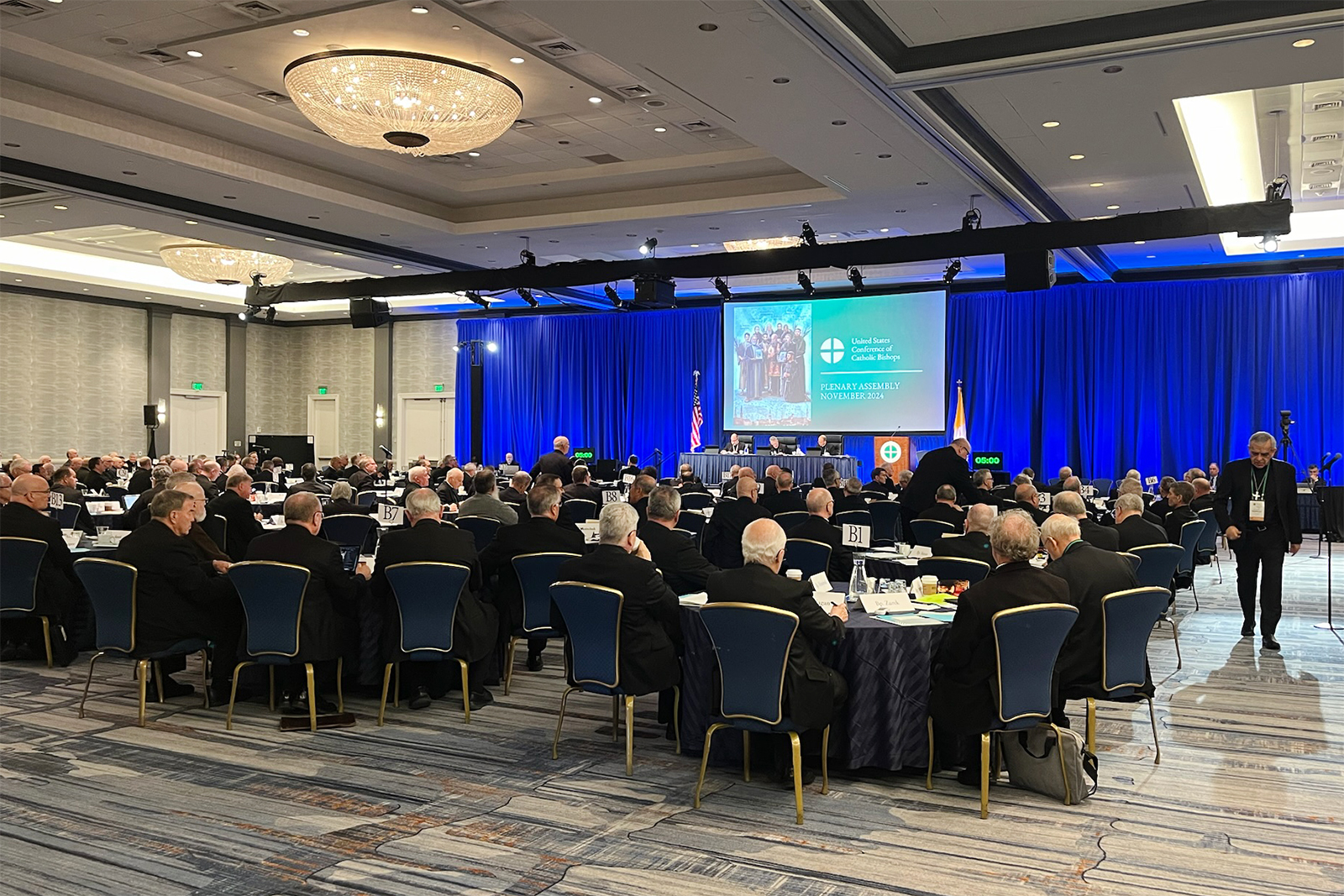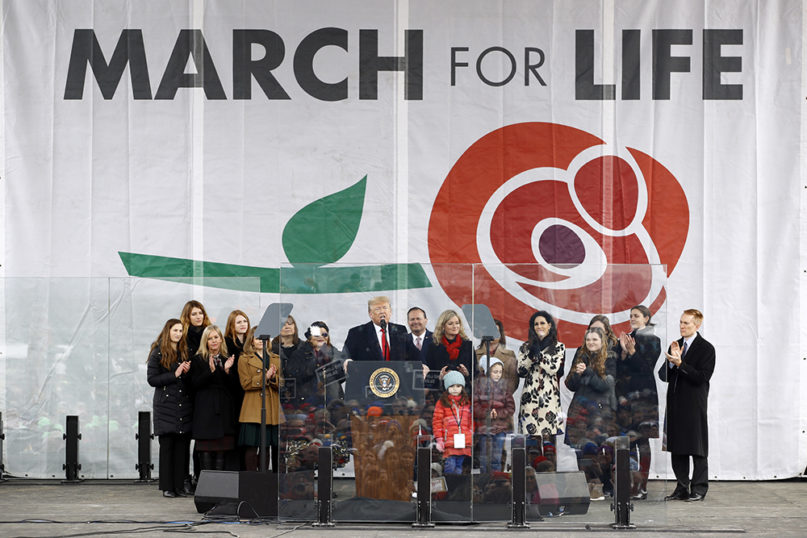
(RNS) — The American Catholic bishops, like everyone else in the United States, must figure out how to respond to the incoming second Trump administration, not least because Trump II’s top issues are of concern to the bishops.
Progressives have long accused the Catholic bishops of being tools of the Republican Party, but, unlike several prominent evangelical Christian ministers, the bishops did not endorse Donald Trump for president.
The bishops have long sided with the Republicans on positions on abortion, gender identification and religious liberty — specifically, the right of Catholic institutions to be free of government regulations. But they also support the rights of migrants and refugees and many Democratic economic programs.
Now that the Republicans have abandoned their fight against abortion, the party and the bishops will have less in common in the future.
How strongly will the bishops express their agreements and disagreements with the Trump administration?
If history is prologue, we can get some answers by looking at how the bishops dealt with the first Trump administration. One way to measure this is to look at positions taken by the U.S. Conference of Catholic Bishops as described in their own press releases at the time.
In August of 2020, I looked at over 160 USCCB press releases published on the USCCB website from January 2019 through July 2020 that dealt with public policy issues. In more than 30 press releases addressing abortion and other pro-life issues, the bishops made clear their opposition to fetal tissue research, assisted suicide and government funding of abortion, as well as their support for state and federal restrictions on abortion.
For example, they welcomed the reinstitution of the Mexico City Policy “to ensure that U.S. taxpayer dollars are not used to perform or promote abortion internationally.”
“We are deeply grateful for the President’s pro-life commitment,” one press release said, “and for all the actions this administration has taken to protect unborn children and their mothers from the violence of abortion.”
The bishops will undoubtedly support any anti-abortion policies proposed by the administration or Congress and will oppose any programs supporting in vitro fertilization proposed by Trump, who on the campaign trail called himself “the father of IVF,” and JD Vance, who said the administration would back the abortion pill. More difficult will be dealing with the administration’s inaction on federal abortion legislation.
Seven press releases addressed freedom of conscience protection that the new administration will undoubtedly support again. The bishops hailed measures allowing health care workers to opt out of performing or assisting with abortions or other procedures they see as immoral. They were also delighted by the Supreme Court’s decision in favor of the Little Sisters of the Poor, an order of nuns who opposed the Affordable Care Act’s contraception mandate.

President Donald Trump speaks at the March for Life rally on Jan. 24, 2020, on the National Mall in Washington. (AP Photo/Patrick Semansky)
Another dozen or so releases stood by the Trump administration’s positions on issues affecting LGBTQ persons. The bishops voiced opposition to the Equality Act, which would extend the discrimination protections of the 1964 Civil Rights Act to gay and transgender people.
The bishops also commended a proposed rule change that would allow faith-based adoption agencies to decline services to gay married couples without being excluded from federal aid as a result.
In a dozen other press releases, the bishops supported expanding government aid to faith-based agencies, including education, another issue on which the bishops and the administration saw eye to eye.
On the other hand, on immigration, foreign policy, the death penalty and the environment, the honeymoon was over within six months of Trump taking office.
In 22 press releases on immigrants and another 13 on refugees, the bishops forcefully attacked the administration’s policies as “misguided and untenable,” “unacceptable,” “appalling,” “devastating,” “very concerning,” “heartbreaking,” “unlawful and inhumane,” “terrible,” “callous,” “disturbing” and “contrary to American and Christian values.”
They consistently argued that migrants and refugees should be welcomed and treated with compassion, arguing that the administration’s actions had “created a climate of fear in our parishes and communities across the country.”
These are not words used by partisan Trump supporters.
In all, the bishops made more than 40 statements defending immigrants and refugees and opposing travel bans and family separation, calling themselves “very concerned” about the impact of the administration’s changes in the “public charge” rule, making it easier to deport immigrants who tried to access government services.
“In our experience serving the poor and vulnerable,” they reported, “we know that many immigrant families lawfully access important medical and social services that are vital to public health and welfare.”
They also railed against the facilities used to detain immigrants.
“Reports of overcrowded and unsanitary conditions are appalling and unacceptable for any person in U.S. custody, but particularly for children, who are uniquely vulnerable,” said the bishops. “Such conditions cannot be used as tools of deterrence. We can and must remain a country that provides refuge for children and families fleeing violence, persecution, and acute poverty.”
The bishops, along with their Mexican counterparts, also opposed Trump’s wall, saying it “first and foremost is a symbol of division and animosity between two friendly countries.” The bishops said that they “remain steadfast and resolute in the vision articulated by Pope Francis that at this time we need to be building bridges and not walls.”
The treatment of asylum-seekers at the border was also a major concern of the bishops in opposing new rules and regulations that “eviscerate our current asylum system.”
The bishops also supported increases in paid sick leave and food security programs, including the Supplemental Nutrition Assistance Program and the Emergency Food and Shelter Program.
Although they praised the CARES Act, they found it “disappointing that certain aid and relief was not extended to the undocumented, and extremely concerning that testing and access to health care coverage was denied to certain immigrants.”
Nor did the bishops rubber-stamp Trump’s foreign policy initiatives. They opposed withdrawing from the Intermediate-range Nuclear Forces Treaty and allowing the START Treaty to expire and urged more efforts toward nuclear disarmament. They opposed withdrawal from the Iran nuclear agreement and encouraged trade, tourism and cultural exchanges with Cuba, calling the embargo “unproductive.”
When it came to abortion and religious freedom, the bishops were allies of the Republicans and Trump, but on many other issues the bishops were his strong and vocal opponents.
Why is it, then, that many people think of the bishops as Republican partisans?
Naming abortion the “preeminent” issue for Catholic voters is part of the problem. The bishops need to push other public policy positions as much as they do their anti-abortion program. It will be interesting to watch how the bishops deal with the Trump administration now that Republicans are pro-choice.
To be fair, the bishops have been pigeonholed by the media as a single-issue constituency. If the bishops oppose abortion or LGBTQ rights, they make news. If they defend migrants, they are ignored or only get a paragraph in a longer story.
The bishops need a media strategy that publicizes the whole range of their policy positions. They may get help if Trump fulfills his promises on deporting undocumented migrants, which will become a huge pastoral problem as parishioners are deported. This will force the bishops into a very big and public fight with Trump over the next four years. As long as he is going to do nothing on abortion, there is no reason for the bishops to pull their punches.
